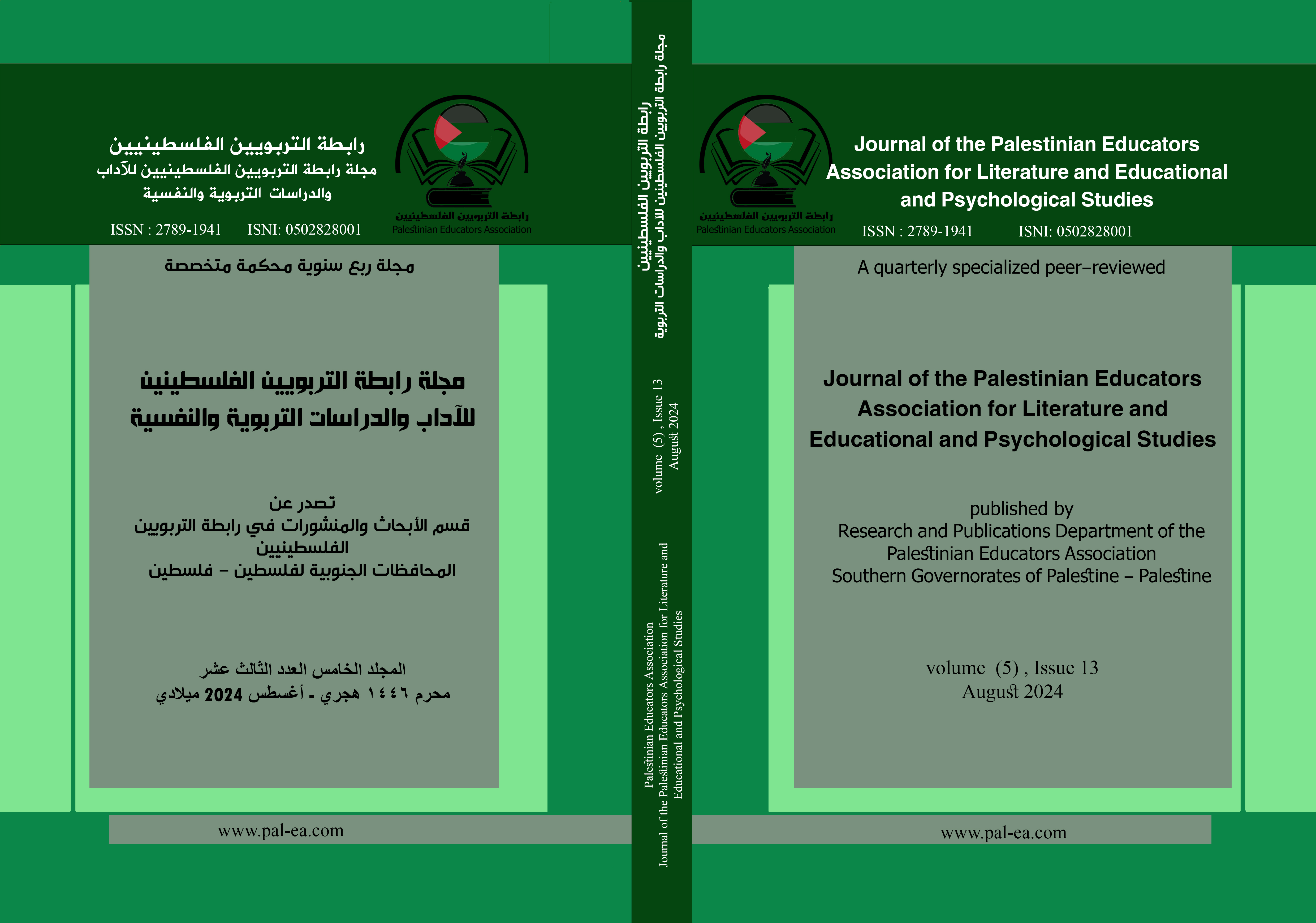دور المدرسة في تنمية ثقافة البحث والاكتشاف والتطوير لدى الطلبة الموهوبين -مدرسة الصداقة الماليزية الثانوية للبنات بضاحية صباح الخير أنموذجا-
الكلمات المفتاحية:
ثقافة البحث – الاكتشاف – التطوير – الطلبة الموهوبينالملخص
يهدف هذا البحث إلى دراسة دور المدرسة في تعزيز ثقافة البحث، الاكتشاف، والتطوير بين الطلبة الموهوبين في مدرسة الصداقة الماليزية الثانوية للبنات بضاحية صباح الخير، وفهم كيفية تأثير هذه الجهود على تطوير المهارات والقدرات لدى الطلاب. تم استخدام مزيج من المقابلات الشخصية مع المعلمين والطلاب، والملاحظة المباشرة للأنشطة المدرسية ذات الصلة، إضافة إلى تحليل الوثائق والتقارير المدرسية.
شملت الدراسة عينة من المعلمين المختصين في تدريس الطلاب الموهوبين، وعينة من الطلاب الموهوبين الذين يشاركون في برامج البحث والتطوير في المدرسة. أظهرت النتائج أن البرامج والأنشطة المدرسية الموجهة نحو البحث والاكتشاف قد تسهم بشكل كبير في تعزيز مهارات الطلاب في هذه المجالات، وتحفيزهم على الابتكار والتفكير النقدي. كما أشارت النتائج إلى أن التفاعل المستمر مع المعلمين الملهمين له تأثير إيجابي على تطوير الطلاب الموهوبين.
أوصت الدراسة بضرورة التخفيف من الأعباء الكتابية على الهيئات التدريسية للمساعدة في تهيئة أجواء نفسية مريحة للطلاب والتفرغ من اجل تطوير تلك المواهب وضرورة مزيد من التفاعل بين المدرسة والمجتمع المحلي لدعم البرامج التعليمية، وتطوير استراتيجيات لتقييم فعالية الأنشطة التعليمية، بالإضافة إلى تقديم دعم مستمر للمعلمين لتعزيز مهاراتهم في تعليم البحث والتطوير للطلاب الموهوبين.
التنزيلات
المراجع
References
● [1] Rebecca D. Napier. Jane M. Jarvis. Julie Clark. R. John Halsey. (2023). Influences on Career Development for Gifted Adolescent Girls in Selective Academic Programs in Australia. https://journals.sagepub.com/doi/10.1177/00169862231201604
● [2] Sally M. Reis. (2015). Reconsidering Regular Curriculum for High Achieving Students, Gifted Underachievers, and Relationship between Gifted and Regular Education. https://gifted.uconn.edu/schoolwide-enrichment-model/reconsidering_regular_curriculum/
● [3] The School Counselor and Equity for All Students. (2024). https://www.schoolcounselor.org/Standards-Positions/Position-Statements/ASCA-Position-Statements/The-School-Counselor-and-Equity-for-All-Students
● [4] NYU Web Communications. (2024). Race Influences Teachers' Referrals to Special and Gifted Education, Finds Steinhardt Study. https://www.nyu.edu/about/news-publications/news/2016/october/race-influences-teachers-referrals-to-special-and-gifted-educati.html
● [5] Basha Krasnoff. (2016). Culturally Responsive Teaching A Guide to Evidence-Based Practices for Teaching All Students Equitably. https://educationnorthwest.org/sites/default/files/resources/culturally-responsive-teaching.pdf
● [6] Reis. S. & McCoach. D.. (2000). The underachievement of gifted students: What do we know and where do we go?. https://www.davidsongifted.org/gifted-blog/the-underachievement-of-gifted-students-what-do-we-know-and-where-do-we-go/
● [7] Quality Standards Meeting the Definition of a High Performing Charter School. (2013). https://www.marylandpublicschools.org/programs/Documents/Charter-Schools/Resources/QualityStandardsCharterSchools2013.pdf
● [8] New York State Education Department. (2019). Culturally Responsive-Sustaining Education Framework. https://www.nysed.gov/sites/default/files/programs/crs/culturally-responsive-sustaining-education-framework.pdf
● [9] Ministry of Education Malaysia. (2013). Malaysia Education Blueprint 2013 - 2025. https://planipolis.iiep.unesco.org/sites/default/files/ressources/malaysia_blueprint.pdf
● [10] Figgett. Katrina. (2019). Resource Guide for the Education of Gifted Students in Florida. https://www.fldoe.org/core/fileparse.php/5660/urlt/RGEGSF.pdf
● [11] Francesca Gottschalk, Crystal Weise. (2023). Digital equity and inclusion in education: An overview of practice and policy in OECD countries. https://one.oecd.org/document/EDU/WKP(2023)14/en/pdf
● [12] Reding. Cheryl. (2020). Building Leadership program standards June 09, 2020. https://www.ksde.org/Portals/0/TLA/Program%20Standards/Building%20Leadership%20Standards%20final%2006-09-2020.pdf?ver=2020-06-15-165643-683
● [13] Kyung Hee Kim. (2011). The Creativity Crisis: The Decrease in Creative Thinking Scores on the Torrance Tests of Creative Thinking. https://www.nesacenter.org/uploaded/conferences/SEC/2013/handouts/Kim_Creativity-Crisis_CRJ2011.pdf
● [14] College of Education Course Descriptions. (2024). https://www.fau.edu/registrar/university-catalog/catalog/educationdes/
● [15] The National Working Group on Advanced Education. (2023). Building a Wider, More Diverse Pipeline of Advanced Learners. https://fordhaminstitute.org/national/research/building-wider-more-diverse-pipeline-advanced-learners
● [16] Valued Gateway Client. (2013). GIFTED STUDENTS: RECOMMENDATIONS FOR TEACHERS. https://www.education.udel.edu/wp-content/uploads/2013/01/GiftedStudents.pdf
● [17] Justin Raudys. (2018). 11 Real Ways to Build a Positive School Culture. https://www.prodigygame.com/main-en/blog/school-culture/
● [18] Michael R Doran, Katherine Christian, Wendy Wright, Carolyn Johnstone, Jo-ann Larkins. (2021). Research Culture: A survey of early-career researchers in Australia. https://elifesciences.org/articles/60613
● [19] School Integration. (2023). https://www.aft.org/ae/fall2019/kahlenberg_potter_quick
التنزيلات
منشور
إصدار
القسم
الرخصة
الحقوق الفكرية (c) 2024 ايناس فؤاد أبو فرحة (مؤلف)

هذا العمل مرخص بموجب Creative Commons Attribution-NonCommercial-ShareAlike 4.0 International License.
مجلة رابطة التربويين الفلسطينيين للآداب والدراسات التربوية والنفسية
الرقم الإلكتروني: 1941-2789
احتفاظ المؤلفين بحقوق الطبع والنشر
تسمح مجلة رابطة التربويين الفلسطينيين للآداب والدراسات التربوية والنفسية للمؤلفين بالاحتفاظ بحقوق الطبع والنشر ومنح المجلة حق النشر الأول مع العمل المرخص في نفس الوقت بموجب ترخيص Creative Commons Attribution (CC-BY) 4.0 الذي يسمح للآخرين بمشاركة العمل مع الاعتراف بتأليف العمل ونشره الأولي في هذه المجلة.
بشرط أن يكونوا أصحاب حقوق الطبع والنشر لعملهم، يستطيع المؤلفون الدخول في ترتيبات تعاقدية منفصلة وإضافية للتوزيع غير الحصري للنسخة المنشورة من العمل في المجلة (على سبيل المثال، نشرها في مستودع مؤسسي، في مجلة) أو نشره في كتاب) مع شكر على نشره الأولي في هذه المجلة.
يُسمح للمؤلفين ويتم تشجيعهم على نشر أعمالهم عبر الإنترنت (على سبيل المثال، في المستودعات المؤسسية، أو المستودعات الصارمة، أو على موقع الويب الخاص بهم) قبل وأثناء عملية التقديم.










